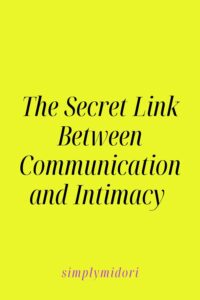Mental health professionals hear about a wide variety of serious relationship problems and challenges in a couples therapy session. Typically they all boil down to two feelings: “We are so disconnected” and “We just don’t communicate effectively.”
In couples therapy sessions typically both people report that the relationship started off quite well, but gradually life began to get busier, and each partner began to give less attention to nurturing the relationship.
Over the long run, couples start to spend less time together, spending even less time working on successful marriage necessities: improving communication, building emotional intimacy, and sustaining their sex life, which when you do without, results in more irritation with each partner. The more irritated the couple became with each other, the less likely it was for them to communicate effectively and connect.
Once a couple finds themselves in this vicious cycle, it’s difficult for them to find their way out on their own, hence couples therapy. Emotionally focused couple therapy has proven effective in addressing disconnection and communication issues, helping couples navigate difficulties and improve their relationship satisfaction.
What is the first step in marriage counseling?
Usually, when people come to couples therapy, they want to identify problematic areas, i.e., household chores, sex life, substance abuse, the constant fighting, religious beliefs, and navigating past events or past relationships and conflicts. However, the initial session is crucial for addressing relationship history, individual concerns, and building rapport, which helps the counselor understand the dynamics between partners. The first step I focus on in couples therapy is to reconnect.
How?
The couple should spend 15-20 minutes a day together, alone and undistracted, to get on the same page. I encourage clients to do this in the evening after dinner, dishes, and the children are asleep. The couple can have tea, coffee, or a drink, with some music and dim lighting to create a calming experience with some couples therapy questions.
What questions does a couples therapist ask?
Each set of questions acts as one day of marriage counseling. The married couple reads a brief description of a topic and why it is relevant to relationship health and then takes turns asking one another a series of ten questions that will guide them through a conversation about the topic.
Topics vary in emotional intensity and are all presented in a reader-friendly, non-judgmental, and safe manner. These conversations are an opportunity for growth in your relationship and provide a space to address conflict in a healthy and productive way.
Couples Therapy Questions To Remember How You Fell In Love
There is no better place to start in your first session of marriage counseling than reflecting back on those first days of falling in love with each other, you know before past conflicts clouded your relationship dynamics! When reminiscing about the early stages of your romantic relationship, I’m sure you remember it as a wonderful and exciting time.
The first of the 7 marriage counseling sessions will remind you of why you chose to have a future together, creating a renewed vigor for your relationship!
Take turns asking each other the following marriage counseling questions:
- Do you remember the first time we met?
- What was the first thing you noticed about me?
- What were your first impressions of me?
- When did you know you had fallen in love with me?
- Do you remember who said, “I love you” first?
- What was it about me that you fell in love with?
- What are the things that you love most about me now?
- When do you feel closest to me now?
- Do I show you often enough that I still love you?
- What can we do to make our relationship feel new and exciting?
Couples Therapy Questions To Rekindle Your Friendship
After a few marriage counseling sessions I ask couples if they consider each other friends? Believe it or not, when I ask this question, both partners typically are unsure how to answer. A family therapist emphasizes the importance of listening to understand one’s partner’s concerns, which is a key aspect of a harmonious relationship. I am sure that at the beginning of your relationship, you did think of your partner as a friend, maybe even your new best friend.
Friendship is a key foundational component of a healthy relationship. But suppose you do not think of each other as friends but instead as spouses, co-parents, financial partners, etc. In that case, you probably treat each other with less respect and consideration than your actual friends and often feel your emotional needs are not being met by romantic partners.
In premarital counseling if a couple does not have a healthy friendship, I recommend not getting married. In relationship counseling if a couple does not have a healthy friendship I urge them to make their friendship a priority by spending quality time together.
The following conversation focuses on the traits that create a healthy friendship to strengthen your relationship’s friendship.
Friendship Questions
Take turns asking each other the following couple therapy questions. A family therapist can take relationship questions to help couples understand each other’s concerns and improve their friendship:
- Do you think I make spending time with you a priority?
- Do I show enough interest in your activities?
- Do you think that I am able to consider your point of view and make compromises?
- Do I treat you with enough respect and consideration?
- Are you able to share your likes, dislikes, hopes, and dreams with me?
- Are you ever hurt by the things I say to you?
- Do I act like I value what you bring to my life?
- Are you able to have as much fun with me as you do with your friends?
- Do I tell you often enough how much I appreciate your friendship?
- How can I be a better friend to you?
Couples Therapy Questions To Feel Loved Again
The next step in marriage counseling is exploring the universal human need to feel loved. I’m sure that early on in your relationship, you found it effortless to show your partner love with words, actions, and physical affection, but as time passed and life got busier, you may have begun to take each other for granted.
In order to create a long-lasting, relationship dynamic, love needs to be thought of not only as a feeling but also as a behavior. In other words, love is not just something you feel but something that you show through actions. The following conversation focuses on how you and your partner experienced love and affection in your family of origin, how you experience it currently, and how you can continue to nurture it in your relationship going forward.
Questions About Feeling Loved
Take turns asking each other the following couple therapy questions:
- Did your family openly express affection?
- Were your parents affectionate with each other?
- How did you feel cared for as a child?
- Did your parents tell you they loved you?
- Am I affectionate enough with you?
- When was the last time I made you feel cared for?
- Do you like me to tell you I love you every day?
- Do you like me to give you gifts?
- How important are compliments from me?
- Are you willing to make a commitment to do something daily to show me you love and care for me?
Couples Therapy Questions To Practice Acceptance
The root of the word “accept” is the Latin term for “receive.” When we accept someone for who they are, we are truly receiving them in our hearts. You most likely found it easy to overlook your partner’s flaws at the beginning of your relationship and might even have found them charming. As time passed, these charming flaws became really annoying to you and gradually even a serious issue.
Over time you may have found yourself using the words “always” or “never” to describe your partner. For instance, you may say, “You never make plans for us,” or “You are always late for dinner.” Unfortunately, these types of generalizations can result in your partner feeling that love and acceptance have become very conditional in your relationship, and one or both of you are apt to begin to pull away emotionally. The following conversation focuses on how well you each tolerate strengths and weaknesses in yourselves and each other and on creating a greater sense of acceptance in your relationship.
Couples Therapy Questions To Ask About Feeling Accepted
Take turns asking each other the following couple therapy questions:
- Is it easy or difficult for you to admit to having weaknesses?
- Do you feel you can be yourself with me?
- Does it feel safe to be weak or vulnerable with me?
- Do you feel I love and accept you unconditionally?
- Do you feel accepted by me more than you feel disapproved of?
- Do you feel that I notice more what you do right than what you do wrong?
- Is it easy to approach me about my weaknesses or things I do wrong?
- If the things that bother you about me never change, will you still be ok with me?
- Do you feel that I am as accepting of you now as I was early in our relationship?
- Is there anything that I can do to improve the feelings of acceptance in our relationship?
Couples Therapy Questions To Bring About Understanding
At our core, we all want to be understood. We are often willing to agree to disagree if, and that’s a big if, we believe we have been heard and our feelings have been respected. A family therapist can play a crucial role in these relationships, facilitating empathy and understanding between partners, helping them listen to each other’s concerns. In marriage counseling I often see couples engaging in “I’m right and you’re wrong” conversations, eyes rolling, arms crossed, staring in opposite directions with an invisible bridge burned between them.
Yet, when I softly and gently point out the emotional pain and need I see beneath the frosty surface complaints, a slow thaw often begins. Bodies begin to shift toward each other, some eye contact is made, eyes moisten, and an emotionally honest conversation begins. When a couple can go to this emotionally open place, they are more able to relinquish their point of view for a moment and to show each other empathy. The following conversation focuses on how to show empathy to one another as you did early on in order to create an emotionally safe and intimately connected relationship going forward.
Couples Therapy Questions To Ask About Feeling Understood
Take turns asking each other the following couple therapy questions:
- What is your first memory of being upset as a child?
- Did anyone comfort you?
- Was it acceptable to experience feelings as a child?
- If not, which ones were acceptable and which were not?
- Did you see your parents express a wide range of feelings?
- Did you ever see your parents comfort each other?
- Do you feel embarrassed to have or share any feelings?
- What do you need most from me when you feel upset?
- Do you feel safe to share all of your feelings with me?
- Do you think that I share my feelings enough?
Couples Therapy Questions That Ask & Answer Are You Still Into Me?
I’m sure that when you think back on the early days of your relationship, you can recognize that experience of emotional and physical tunnel vision, being magnetically drawn to each other and feeling that time was suspended when you were together.
As intoxicating and awesome as those feelings were, they were not the same as experiencing true emotional intimacy. Emotional intimacy develops over time as you and your partner learn to balance being separate individuals with maintaining a connection to each other.
A romantic connection involves caring for one another and sharing enjoyable experiences as you would with a friend, but also—and crucially important—is feeling and expressing a desire to be together and nurturing your sensual/sexual relationship. All of these are important dimensions of emotional intimacy. The following conversation focuses on nurturing your romantic connection in order to create greater emotional intimacy to build a satisfying sexual relationship.
Couples Therapy Questions To Ask About Personal Preferences
Take turns asking each other the following couple therapy questions:
- How do you define emotional intimacy?
- How comfortable are you being emotionally intimate with me?
- Do you feel like I miss you when we are apart?
- Are you comfortable spending time without me?
- Do I ever make you feel guilty for spending time alone or with your friends?
- Do you think we have enough fun in our relationship?
- Do you feel connected to me even though we are doing things separately?
- Do you think we spend enough time talking about our feelings, hopes, and dreams?
- Do you think I am affectionate and make our sexual relationship a priority?
- Is there anything I can do to improve the emotional intimacy in our relationship?
Couples Therapy Questions To Create A Ritual
In couples counseling I explain the importance of rituals. Rituals create a great sense of connection in your relationship, especially when a spouse has a bad day. A family therapist can help couples create and maintain meaningful rituals, which foster better communication skills and understanding. I’m sure you can think back on early informal rituals, such as spending a few moments together in bed each morning talking, or more formal ones, such as preparing special foods together on the holidays.
Regardless of where, how, and when you celebrated the ritual, you likely found it created a sense of closeness, connection, anticipation, and security in your relationship. Creating and maintaining rituals to celebrate special occasions also allows you to form a deeper sense of shared meaning in your relationship. The following conversation focuses on nurturing your romantic connection in order to create greater emotional intimacy to build a satisfying sexual relationship.
Couples Therapy Questions To Ask About Relationship Dynamics and Values
Take turns asking each other the following marriage counseling questions:
- Are rituals important to you?
- Did your family value rituals?
- Who was the most active in implementing them?
- Are there any rituals from your childhood that you would like us to implement?
- What were holidays, birthdays, and other celebrations like growing up?
- Of the rituals we have, what are your favorites?
- Do you think it’s important to eat dinner together?
- What do we celebrate?
- Do you think kissing hello, goodbye, and goodnight are important rituals?
- Would you like to have more rituals in our life together?
Conclusion
Congratulations on completing 7 days of marriage counseling questions. As a couples therapist it’s exciting to see a couple start the journey to a happier healthier relationship and positive future.
The marriage counseling questions above are what I ask to help reconnect a couple. Past events can create what feels like massive relationship challenges, but in reality, it just takes one partner to spark the journey back to a healthier relationship.
I hope you enjoyed reminiscing and remembering the early days. If you enjoyed connecting over these questions you may discover that couples therapy is exactly what your relationship needs!
No matter if you decide to attend a couple therapy session with an actual licensed marriage counselor or not I encourage you to develop intimacy by attending to each other’s feelings, making time for physical intimacy, finding ways to have fun, and developing sweet rituals while also balancing your own life outside of the relationship!











